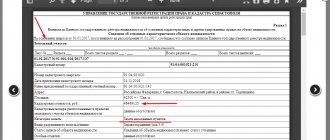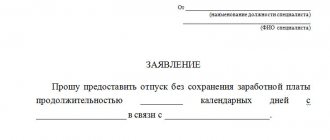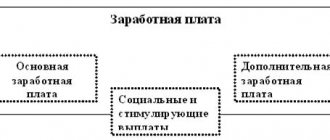Who should not be given a probationary period?
The Labor Code of the Russian Federation contains a list of employees for whom a probationary period cannot be established, these are:
- pregnant women and women with children under 1.5 years of age;
- persons who are elected through a competition to fill the relevant position;
- minors;
- persons who have received secondary vocational education or higher education and are getting a job for the first time within one year;
- persons who were elected to an elective position for paid work;
- persons with whom an employment contract is concluded for a period of up to two months;
- and other persons in cases provided for by the Code, federal law or collective agreement.
Probationary period and employment contract
By hiring an employee for a probationary period, the employer is not exempt from concluding an employment contract with him. The employment contract must reflect the existence of a probationary period. The salary amount must also be indicated in the document. However, it cannot be less than what employees in a similar position receive. All provisions of current legislation must be applied to an employee who is on a probationary period. He has all labor rights and obligations. This means that an employee can be held accountable if he violates the norms of the Labor Code of the Russian Federation. The absence of a probationary clause in the employment contract means that the employee was hired without a trial. In the event that an employee is actually allowed to work without drawing up an employment contract (part two of Article 67 of this Code), the probationary clause can be included in the employment contract only if the parties formalized it in the form of a separate agreement before starting work. 3 months is the maximum test period. For company managers and their deputies, chief accountants and their deputies, heads of branches, representative offices or other separate structural divisions of the company - 6 months. If the employment contract is concluded for a period of 2 to six months, the probationary period should be no more than two weeks. The probationary period does not include time:
- when the employee was temporarily disabled;
- periods of actual absence of an employee from work.
It turns out that the employee will increase his probationary period if, for example, he gets sick. The probationary period cannot be extended at the request of the employer. When it ends, he needs to decide whether to hire the employee or fire him. However, it can be reduced. For example, if the employer realized that the employee successfully completed his job responsibilities. The start of the probationary period is considered from the first working day, regardless of the date of the employment contract. There is no need to record the establishment or end of the probationary period in the work book.
Entry in the employment contract
The introduction of a probationary period is an important point that helps the parties evaluate each other during this period and decide whether their cooperation is possible in the future.
Throughout the entire probationary period, the manager has the opportunity to familiarize himself with the professional and personal qualities of a particular employee and make sure that he copes with the tasks assigned to him.
During the preliminary test period, an employee can quite fully and objectively assess the duties assigned to him, get acquainted with his superiors and staff, and decide whether he needs this work.
While the probationary period lasts, both interested parties have time to understand whether further cooperation will be truly mutually beneficial, whether it is worth continuing the employment relationship, or whether it is better to look for other options without wasting time.
He talks about the rules for maintaining work records of employees and storing them with the employer.
article
.
How to correctly write in orders for an enterprise about the appointment of a temporary acting officer and other documentation: interim, interim or interim?
You can find the requirements for drawing up employee characteristics for presentation to various authorities, as well as sample documents here.
The fact and duration of the preliminary test for the employee are fixed by the hiring order and must be specified in the employment contract.
The test is not recorded in the work book.
During the probationary period, an employee has the same rights as his colleagues:
- receive a salary and various bonuses to it (for overtime work, expanded service area, bonuses and additional payments provided for in the bonus regulations);
- issue sick leave and receive payment for it in case of illness;
- use, if necessary, vacation at your own expense or days on account of labor leave;
- terminate the employment relationship with the employer before the end of the probationary period.
The responsibilities of the subject are stipulated in the employee’s employment contract or job description. They are no different from the responsibilities of other employees. These are, among other things:
- compliance with discipline (labor and performance),
- internal regulations,
- safety precautions, etc.
- during the probationary period he demonstrated his professional suitability, successfully coped with his duties, and did not commit violations of labor discipline;
- the probationary period provided for in the employment contract has ended;
- the employer has no claims against the employee, and he continues to work.
In this case, there is no need to issue an order to end the probationary period or make an entry in the employee’s work book.
What are the possibilities for terminating an employment contract during the probationary period? Watch the video.
What is the difference between overtime and irregular working hours? How an employee’s irregular working hours are established and how his work is paid, read
Here
.
We suggest you familiarize yourself with: what you will need to stitch documents and how to stitch documents correctly.
- no more than 2 weeks;
— probationary period of 3 months (or less);
- up to six months;
- up to one year.
At the same time, the shortest duration is provided when a fixed-term employment contract is concluded (up to six months). This also applies to seasonal workers. A probationary period of 2 weeks may be established for them, but no more.
However, it usually lasts longer. In most cases, the probationary period lasts up to 3 months. The Labor Code of the Russian Federation indicates that it can end by agreement of the parties or earlier, but not later. A period of 6 months can be set, for example, for the head of the company, its representative office, branch, chief accountant, as well as their deputies.
In what cases is hiring carried out for a probationary period for the longest period of time? For example, when an employee enters the civil service. How long does the probationary period last in this case? Up to one year. However, if an employee is transferred to a new place from one government agency to another, then the maximum period is six months.
The rules listed above do not apply to all potential employees. There are categories of employees for whom a probationary period cannot be established (the Labor Code of the Russian Federation indicates relevant cases). These are pregnant women, candidates under 18 years of age, employees with whom the contract is concluded for 2 months or less.
Another case is if a candidate was hired through a competition. In addition, this category includes former students who have received higher, secondary or primary education and who are taking up positions in their specialty for the first time. Also, hiring for a probationary period is impossible for disabled people who were assigned to this position based on the results of a medical examination.
Nevertheless, almost all companies pay lower salaries to employees during the probationary period. This can be done quite legally by changing, for example, the salary of employees for a newbie position in the staffing table. However, it should be remembered that its size should not be lower than the minimum wage.
A specialist on a probationary period may be paid a bonus, as well as other incentive payments that are specified in the regulations on remuneration and bonuses. The employer is also required to pay the subjects overtime, sick leave, and time off work on holidays and weekends.
— receive a salary, bonuses, salary supplements for overtime work, as well as other incentive payments;
— take a sick leave certificate, on the basis of which you can receive insurance payments during your period of incapacity;
- resign at any time on your own initiative (it is not necessary to wait until the end of the probationary period);
- take a weekend at your own expense or towards a future vacation; however, the employer in this case can refuse leave on legal grounds, if this does not contradict the Labor Code of the Russian Federation, Article 128: for example, if an employee has a child, then he should be given time off without pay for up to five days.
— observe internal regulations, fire and labor discipline;
— comply with the terms of the contract;
- Perform work duties in accordance with the job description.
First of all, you should prepare a notice in writing for the employee in advance, in which you need to indicate the reasons why further cooperation is impossible. They must be documented. This could be an act of disciplinary action, an employee’s failure to fulfill work duties, written complaints from clients who interacted with a specialist, or, for example, minutes of a commission meeting in which the outcome of the probationary period was determined, etc.
The next step is to give the employee this notice no later than three days (preferably 4) before the end of the probationary period or the date of his planned dismissal (if the decision to terminate the contract was made much earlier than the end of the probationary period). Please note that if this is not done on time, the employee will automatically be considered to have passed the test.
We invite you to read: Returning watches according to the law
The next step is for employees to familiarize themselves with the notice and sign it with the date. If those who have not completed the probationary period refuse to sign, the employer draws up a special act. It must be signed by at least 2 witnesses.
Next, a dismissal order is issued. An entry is made in the work book corresponding to his article.
The next step is that on the day of dismissal, the employee receives a salary for the days he worked, a work book and compensation for unused vacation, if any.
If a specialist independently decides to terminate the contract before the end of the probationary period, the employer should be notified about this. He must write a letter of resignation, indicating the reason “on his own initiative,” and then the contract is terminated under this article. If employees who have already completed their probationary period are required to notify their employer of their desire to resign two weeks in advance, then an employee undergoing probation must notify him only three days in advance.
A probationary period can be beneficial for both the employer and the employee. It gives the employer the opportunity to test the new employee in action, and the employee - to make sure that the job is suitable for him. But at the same time, any employer expects maximum output from employees and does not want to pay in full for work whose quality or volume does not satisfy him.
During the probationary period, when the employee’s professional qualities have not yet been fully assessed, and his experience and skills may objectively be insufficient for satisfactory performance, many employers prefer to reduce wage costs. Some employers would prefer not to pay wages at all during the probationary period, others would like to set lower wages than required according to the staffing schedule.
How to adapt newcomers without experience?
Article 70 of the Labor Code of the Russian Federation allows the use of a trial period to assess the business qualities of an employee when hiring. At the same time, the article states that during the probationary period, the employee is subject to all norms and provisions of regulatory and legislative acts regulating labor relations. This means that the probationary period cannot serve as a basis for limiting any rights of the employee.
How does the probationary period work?
Completing a probationary period usually does not differ in any way from the normal performance of job duties. During the probationary period, the employee is subject to the provisions of labor legislation and other regulatory legal acts containing labor law norms, collective agreements, agreements, and local regulations. This means that it is impossible to limit the employee’s rights during this period. Please note that in this case the employee is not relieved of his direct duties. For failure to comply, he may be held accountable. For example, make a reprimand or reprimand. And in some cases, the dismissal of an employee is allowed. When hiring an employee (before signing an employment contract), the employer must familiarize him with the internal labor regulations and other local regulations that are directly related to the employee’s work activity and the collective agreement. Details of the probationary period can be indicated in a special document. This may include: a training schedule, assignment of a mentor, criteria for determining successful completion, etc.
Dismissal of an employee who has not passed the test period
Please note that establishing a probationary period is not the responsibility of the employer. The probationary period must be specified in the employment contract (Article 70 of the Labor Code of the Russian Federation).
Please note: a probationary period according to the Labor Code of the Russian Federation cannot be established only by order, even with the consent of the employee. If the probationary period is not mentioned in the contract, the employee is considered hired without it.
"1. Subject of the agreement.
1.1. An employee is hired as an editor for an indefinite period.
1.2. Start of work - February 2, 2021.
1.3. This agreement establishes a probationary period of 3 (three) months.”
Organizations make common mistakes when it comes to remuneration.
The first mistake is that employers often indicate in the employment contract “salary according to the staffing table,” which may entail penalties when the enterprise is inspected by the labor inspectorate, since the employment contract must indicate a specific amount (Article 57 of the Labor Code of the Russian Federation).
The second mistake is that company managers set an employee’s salary during the probationary period lower than that provided for in the staffing table. Although you cannot reduce wages during this period.
On the one hand, employers are easy to understand - at first, a new employee will cope with his responsibilities a little worse than older employees. Why should a newcomer be paid a full salary right away? On the other hand, according to Article 135 of the Labor Code of the Russian Federation, the terms of remuneration determined by the employment contract cannot be worsened. But the Labor Code does not say that during the probationary period the employee’s remuneration has any specifics.
Keep in mind that it costs nothing for the “injured” employee to return the underpaid amounts in court. The inspectors will force him to pay the missing amount, imposing a fine in accordance with Article 5.27 of the Code of Administrative Offenses of the Russian Federation.
However, in practice, managers find ways to circumvent this prohibition. It is enough to indicate a lower salary in the employment contract, without stipulating that this is done for the duration of the probationary period. If the test is successfully passed, the organization will enter into an additional agreement with the employee to the employment contract and increase the salary.
There is another way out - to name positions differently and set different salaries for workers. Then the organization will not have problems. For example, if the organization employs several engineers, name them differently (1st category engineer, leading, senior, etc.).
It is convenient to establish different job titles in small companies, where it is easy to change the staffing schedule for each person who is undergoing a probationary period. In a large company, the HR manager simply does not have the imagination to name all the positions differently. Therefore, it can be recommended to include several parallel positions in the staffing table: engineer trainee, engineer trainee 1st category, etc.
Two or three such positions are enough for a large department. When one of the engineers quits, you can replace him with an employee as an intern, and if successful, transfer him to the position of engineer. And the trainee position may remain vacant until the next applicant for the engineer position.
If an employee does not perform his duties well, he will remain an intern. The employer is not obliged to translate it if these conditions are not specified in the contract. In addition, a narrower range of responsibilities should be established for interns, since the employee is just getting into the swing of things and this will help explain his small salary during the first time working in the company.
The question of whether it is necessary to make an entry about the probationary period in the work book interests many employers.
The law clearly establishes that there is no need to mention a probationary period in the work book; only a record of hiring is made in it, and from the date on which the employee began performing work duties in the verification mode.
The employer must make all the necessary entries in the work book of each employee who has worked for him for more than 5 days, but only if this is a permanent place of work for the person.
Thus, the condition of the probationary period is fixed only in the employment contract.
If during the testing process it turns out that the employee is not suitable for performing the tasks assigned to his job duties, the management of the enterprise can fire him. Moreover, this must be done during the test period, or, in extreme cases, on its last day. Otherwise, the employee will be considered to have successfully completed the test.
Important! During the probationary period, the employer should closely monitor how the employee completes the tasks given to him. If they are untimely or of poor quality, this must be recorded (for example, in official memos and memos). In the future, if events develop unfavorably, scrupulous documentary support of the test will facilitate the collection of evidence to justify the dismissal of an employee who failed the test.
We suggest you read: Statute of limitations for tax deductions for treatment
The employee must be notified of the impending dismissal at least three days in writing. The notification must necessarily indicate the reasons why it is believed that the employee did not pass the test, as well as attach documents confirming them.
To summarize, we can draw the following conclusion: the probationary period is the time when, despite particularly close attention from the employer, the new employee has all the rights and responsibilities of employees on a permanent basis. You need to approach the registration of a probationary period in strict accordance with the requirements of the law - this will allow you to avoid claims in the future, both from the staff and from the controlling structures.
Dismissal based on test results is possible only if the reasons are explained to the employee.
If an employer does not pay an employee a salary, then he does not pay compulsory social insurance contributions for him. Penalties are also provided for this (Article 47 of Federal Law No. 212-FZ).
It is also unlawful to pay an employee on a probationary period in a smaller amount than provided for in the staffing table, including not awarding bonuses to him, provided that bonus indicators are achieved.
How to set a probationary period for an employee when applying for a job
As one of the options for solving this problem, you can break the payment into several parts. One part is the official salary; it is specified in the employment contract, and its amount must be no less than the minimum wage. Other parts are all kinds of allowances, additional payments, bonuses, etc.
The bonus regulations should include a clause stating that one of the grounds for calculating an allowance or bonus is a certain minimum length of service. If the specified length of service is longer than the duration of the probationary period, then this type of payment will not be accrued to the employee during the probationary period. However, like all other employees who have not accumulated the required length of service.
Labor law applies fully to an employee at the probationary stage. Therefore, if the company stipulated in the contract that this period will not be paid, this is a clear violation of Russian law. In addition, many employers nowadays deliberately set a lower salary for the test subject, promising to increase it later. The following can be said about this.
Firstly, an employee who is at the probationary stage cannot be limited in wages. His rate must be no less than that provided for this position in the staffing table. Secondly, a company that reduces the salary during the probationary period falls under an article such as discrimination.
In the staffing table of a company, for example, there are two positions for a purchasing manager. The first was occupied by an old employee, and the second was invited to a new person with a probationary period. In this case, from the first day of work, the newcomer must have a salary no less than that of an employee who has been working for several years in a similar position.
An employee’s failure to complete tasks in a timely manner, his mistakes, or violation of labor discipline should be documented, and if there are internal memos from managers, they should also be attached. Facts certified in this way should be handed over to the employee for review. To confirm, he must sign.
If the employee agrees with the shortcomings in the work, then an additional agreement is made to the employment contract, and the probationary period is extended. If the employee believes that the claims against him are unfounded and does not give his consent to an additional period, dismissal is allowed, which must be based on written irrefutable evidence.
Definition of the concept
A probationary period according to the labor code is a certain period of time during which the employer can check the professional qualities of the employee being hired and his suitability for the assigned position.
In accordance with legislative norms, the probationary period is established according to uniform rules for all employers, regardless of their form of ownership or organizational and legal structure.
Articles of the Labor Code of the Russian Federation
In the Russian Labor Code, Articles 70 and 71 are devoted to the probationary period. But an employee enrolled in an enterprise on a probationary period is subject to general labor legislation and certain provisions of legal acts that contain the rules and regulations of labor law.
Consequently, such an employee has all the standard labor rights and obligations. And he bears full responsibility under federal law.
According to the law, a probationary period for employment is established solely by agreement of the parties. If one party did not know or did not agree to its establishment, such a provision is a gross violation of federal labor laws.
Recruitment test results
When the probationary period ends, the employer must decide whether to keep the employee or not. You need to understand that if the test period has expired and the employee continues to work, he has successfully passed it. And the subsequent termination of the contract is possible on a general basis. Determining whether an employee meets all requirements can be done by establishing plans. In the case where the work cannot be assessed quantitatively, it is necessary to prepare a special provision that regulates the procedure and method for determining the test results. If the employer is not satisfied with the final result and believes that the employee did not pass the test, he has the right to fire him. In this case, the employee must be notified of this no later than three days before the date of dismissal. If the test result is unsatisfactory, the employment contract is terminated without taking into account the opinion of the relevant trade union body and without payment of severance pay. At the same time, an employee can quit on his own if he believes that the job is not suitable for him. You must also notify about your decision 3 days before your intended departure.
Registration of results
The legislation does not establish a unified mechanism for recording results. Evaluating results is quite subjective, since each manager focuses on the specifics of production activities. It must be remembered that quality assessment occurs only within the framework of the performance of duties. You also need to take into account the objective reasons why the task was not completed.
IMPORTANT! Termination of an employment contract during a probationary period requires preparation of a notice by the employer and is sent at least three days before the designated date of dismissal.








